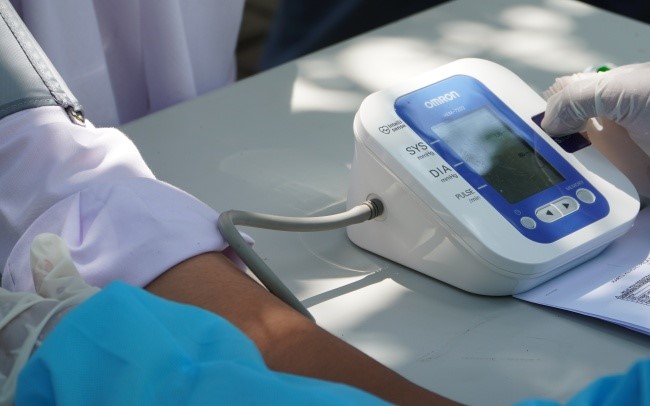ACE inhibitors
Peer reviewed by Dr Colin Tidy, MRCGPLast updated by Dr Toni Hazell, MRCGPLast updated 18 Dec 2023
Meets Patient’s editorial guidelines
- DownloadDownload
- Share
- Language
- Discussion
- Audio Version
ACE inhibitors are medicines that are used mainly in the treatment of high blood pressure (hypertension) and heart failure. They are also used in some people with diabetes, for some forms of kidney disease, and after a heart attack, to help protect the heart.
They have a variety of effects on the body. Their ability to relax blood vessels is one of the most important. The side-effects most commonly associated with ACE inhibitors are usually minor. A common side-effect is a persistent dry cough.

Unsure about mixing medicines?
Check for possible interactions between medicines, supplements and foods before taking them together.
In this article:
Video picks for Heart and blood medicines
Continue reading below
What conditions are ACE inhibitors used to treat?
Angiotensin-converting enzyme (ACE) inhibitors are used to treat a number of different conditions:
High blood pressure (hypertension) - ACE inhibitors usually work well to lower blood pressure.
Heart failure - ACE inhibitors reduce the strain on the heart by decreasing the amount of fluid pumped around the body. They also help the heart by relaxing blood vessels. This reduces the amount of force needed to eject blood from the heart.
Diabetic kidney disease (diabetic nephropathy) - these medicines can help to maintain good kidney function.
Chronic kidney disease - ACE inhibitors may help to slow the progress of kidney disease.
After a heart attack (myocardial infarction).
List of ACE inhibitors
Back to contentsThey include:
Each of these medicines also has various different brand names. Some ACE inhibitor medicines are also part of a combined tablet with a calcium-channel blocker medicine or 'water tablet' (diuretic) medicine.
Continue reading below
How do ACE inhibitors work?
Back to contentsACE inhibitors prevent the body from creating a hormone known as angiotensin II. They do this by blocking (inhibiting) a chemical called angiotensin-converting enzyme.
Angiotensin II has three main effects:
Tightening (constriction) of blood vessels.
Re-absorption of water by the kidneys (taking water back into the body).
Release of the hormone aldosterone which also causes water re-absorption by the kidneys.
Increasing the volume of the blood by adding more water and constricting your blood vessels increases blood pressure.
ACE inhibitors reduce the amount of angiotensin II which causes blood vessels to dilate. The amount of water put back into the blood by the kidneys decreases. These actions reduce blood pressure.
In high blood pressure (hypertension), ACE inhibitors should help to reduce the blood pressure.
In heart failure, there may be too much circulating fluid in the blood vessels. ACE inhibitors help to reduce this. They appear to have a protective effect on the heart and slow the progression of the heart failure.
Who cannot take ACE inhibitors?
Back to contentsPeople who should not take ACE inhibitors include:
Pregnant and breastfeeding women.
Those with a known sensitivity to ACE inhibitors.
Those who have had a severe allergic response to ACE inhibitors in the past - eg, swelling of the lips, eyes or tongue (angio-oedema).
People with certain types of kidney disease - for example, renal artery stenosis.
A full list of people who should not take ACE inhibitors is included with the leaflet that comes with your medicine. If you are prescribed ACE inhibitors, read this to be sure you are safe to take it.
Continue reading below
Side-effects of ACE inhibitors
Back to contentsSide-effects of ACE inhibitors can include:
Low blood pressure (hypotension).
Dizziness.
Persistent dry cough.
Swelling of the lips, eyes or tongue (angio-oedema).
Decline in kidney function.
If you experience low blood pressure and dizziness you should report it to your doctor.
Note: the above is not the full list of side-effects for these medicines. Please see the leaflet that comes with your particular brand for a full list of possible side-effects and cautions.
A number of medicines may interact with ACE inhibitors. In particular, non-steroidal anti-inflammatory drugs (NSAIDs), 'water tablets' (diuretics) and lithium. Your doctor will normally check what other medicines you take and give further advice about this.
So, make sure your doctor knows of any other medicines that you are taking, including ones that you have bought rather than been prescribed.
Patient picks for Heart and blood medicines

Treatment and medication
Beta-blockers
Beta-blockers are medicines that are used to treat a variety of conditions. Their full correct name is beta-adrenoceptor blocking medicines (or beta-adrenergic blocking agents), but they are commonly just called beta-blockers.
by Dr Rosalyn Adleman, MRCGP

Treatment and medication
Medicine for high blood pressure
For detailed information about your own medication you should read the leaflet that comes inside the medicine packet.
by Dr Philippa Vincent, MRCGP
Further reading and references
- Chronic heart failure in adults - diagnosis and management; NICE Guidance (Sept 2018)
- Hypertension in adults: diagnosis and management; NICE (August 2019 - last updated November 2023)
- Marx N, Federici M, Schutt K, et al; 2023 ESC Guidelines for the management of cardiovascular disease in patients with diabetes. Eur Heart J. 2023 Oct 14;44(39):4043-4140. doi: 10.1093/eurheartj/ehad192.
Continue reading below
Article history
The information on this page is written and peer reviewed by qualified clinicians.
Next review due: 16 Dec 2028
18 Dec 2023 | Latest version

Ask, share, connect.
Browse discussions, ask questions, and share experiences across hundreds of health topics.

Feeling unwell?
Assess your symptoms online for free
Sign up to the Patient newsletter
Your weekly dose of clear, trustworthy health advice - written to help you feel informed, confident and in control.
By subscribing you accept our Privacy Policy. You can unsubscribe at any time. We never sell your data.